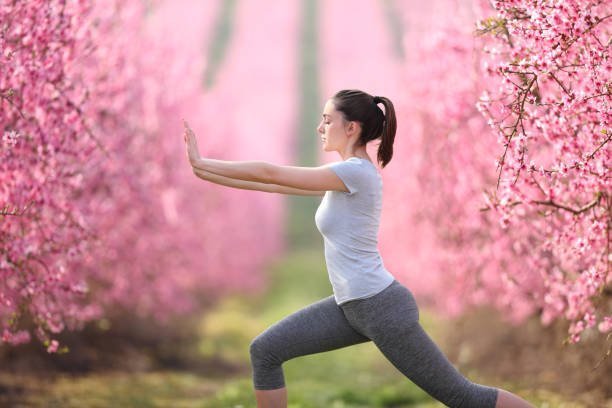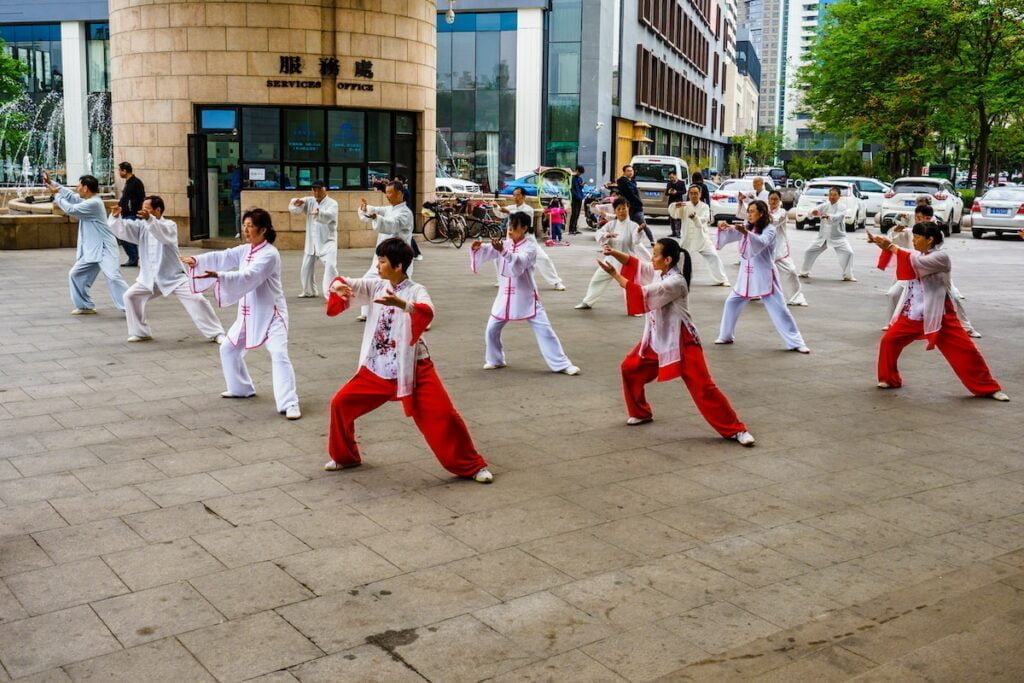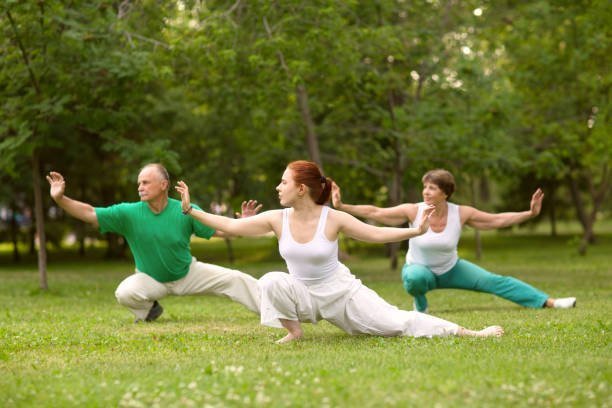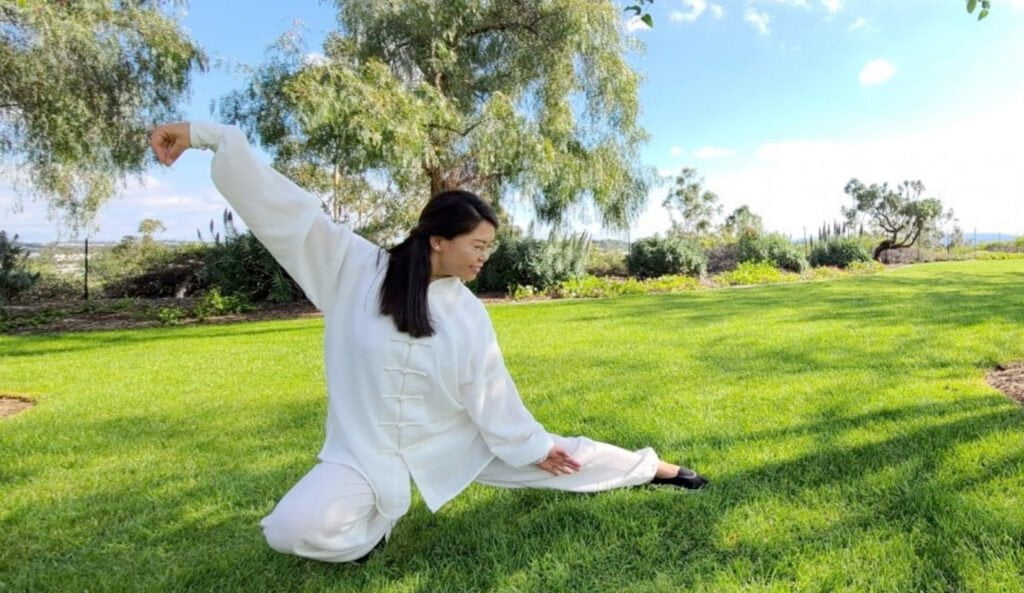For thousands of years, Tai Chi has been a time-tested practice that stands as one of the most powerful solutions for physical and mental health. Originating from ancient Asian traditions, Tai Chi’s healing power is scientifically validated and it’s health benefits rooted in qi, are considered to be the vital energy that courses through our bodies.
When qi flows freely, it brings a sense of balance and robust health. Conversely, when qi becomes weakened or obstructed, it can manifest in a variety of physical, mental, and emotional afflictions. Tai Chi, with its graceful movements and intentional focus, is harmonizing the flow of qi, thus promoting a state of wellbeing that transcends the boundaries of time and culture. Inspired by an increasing number of studies on Tai Chi and a recent report from Harvard Medical School, we invite you to look into the profound healing power of Tai Chi, and how it cultivates a happier and more balanced life when facing modern burnout.

Exploring Qi Energy: an ancient vital energy
In a world driven by modern medicine and technology, it’s easy to overlook ancient practices that have stood the test of time. Tai Chi, with its graceful, slow movements and deep focus on breath and body awareness, has proven to be a powerful solution for a healthier, happier life.
A concept that has captured the imagination and curiosity of many, “Qi” energy, often spelled as “Chi.” is rooted in ancient Chinese philosophy and medicine and represents the fundamental life force that animates all living beings. Often referred to as the “breath of life” or the “vital energy,” Qi is believed to flow through our bodies, nourishing our physical, mental, and emotional states. In this article, we embark on a journey to unveil the enigmatic essence of Qi energy and explore its profound implications on our health and vitality.
At its core, Qi is the essence of existence itself, serving as the bridge between the physical and the metaphysical. In Chinese cosmology, it is said to emanate from the duality of Yin and Yang, representing the complementary forces of nature. While Yin embodies qualities like receptivity and stillness, Yang embodies action and dynamism. The harmonious interplay between these forces is essential for the smooth flow of Qi energy.
In Traditional Chinese Medicine (TCM), Qi energy is central to understanding health and illness. According to TCM, when Qi flows freely and harmoniously, an individual experiences good health, vitality, and emotional balance. Conversely, blockages or imbalances in the flow of Qi can lead to physical ailments, emotional disturbances, and even chronic diseases.
One of the most famous applications of Qi energy in TCM is acupuncture. Acupuncturists insert fine needles into specific points along the body’s meridians, or energy pathways, to stimulate and balance the flow of Qi. This practice is believed to restore health and alleviate various conditions, from pain management to stress relief.
The ancient practices of Qi Gong and Tai Chi are designed to cultivate and balance Qi energy. Qi Gong involves gentle movements, meditation, and breath control to improve the flow of Qi throughout the body. Tai Chi, on the other hand, focuses on a series of slow, flowing movements that promote the circulation of Qi while enhancing balance and harmony.
Qi energy extends to mental and emotional wellbeing. Mindfulness practices, often rooted in Eastern traditions, align closely with the concept of Qi energy. By becoming more attuned to the present moment and one’s inner state, individuals can tap into their Qi energy to reduce stress, enhance focus, and achieve emotional equilibrium.
Qi energy stands as an ancient holistic concept, with applications in the Chinese philosophy and medicine, for health and vitality. Exploring and nurturing the flow of Qi within ourselves can lead to enhanced wellbeing, physical health, and emotional balance in our modern lives.
Boost Your Balance
One of the most striking benefits of Tai Chi is its ability to enhance balance and stability, especially in older adults. According to a study published in the Journal of the American Geriatrics Society, Tai Chi can reduce the risk of falls by a staggering 43%. This is particularly crucial as falls are a leading cause of injury and mortality in the elderly population.
The slow, deliberate movements of Tai Chi challenge your balance, engaging core muscles and improving proprioception—the sense of your body’s position in space. Over time, this practice can significantly reduce the likelihood of debilitating falls, making it an essential component of healthy aging.

Ease Your Pain
Chronic pain can be a relentless burden on both the body and the mind. Tai Chi offers a gentle yet effective solution. Research from the National Institutes of Health (NIH) shows that Tai Chi can provide relief from various types of chronic pain, including arthritis, fibromyalgia, and lower back pain.
The meditative aspect of Tai Chi helps reduce pain perception, while the gentle movements improve flexibility and joint health. Moreover, the relaxation response triggered by Tai Chi can alleviate muscle tension and promote healing in chronic pain conditions.
Reduce Your Stress
Stress has become a common companion, wreaking havoc on our physical and mental health. Tai Chi acts as a powerful antidote to stress. According to a study in the journal “Psychosomatic Medicine,” regular Tai Chi practice can significantly reduce levels of stress hormones in the body.
The slow, flowing movements of Tai Chi promote relaxation and mindfulness, allowing practitioners to let go of stress and anxiety. This practice not only reduces stress but also improves overall mental well-being, enhancing emotional resilience and cognitive function.
Strengthen Your Heart
Cardiovascular health is paramount, and Tai Chi plays a vital role in promoting a strong and healthy heart. Research published in the British Journal of Sports Medicine indicates that Tai Chi can effectively lower blood pressure and improve cardiovascular fitness.
The combination of controlled breathing and gentle exercise enhances circulation, reduces the strain on the heart, and helps manage hypertension. Over time, Tai Chi can contribute to a reduced risk of heart disease, making it an excellent complement to traditional cardiovascular exercises.
The ancient secret of Tai Chi is no longer forgotten. From improved balance and pain relief to stress reduction and enhanced heart health, Tai Chi is a holistic approach to wellbeing that can lead to a healthier and happier life.
Do you want to share your story and inspire our readers ? Know that every story is paving the way for a brighter, happier future.






